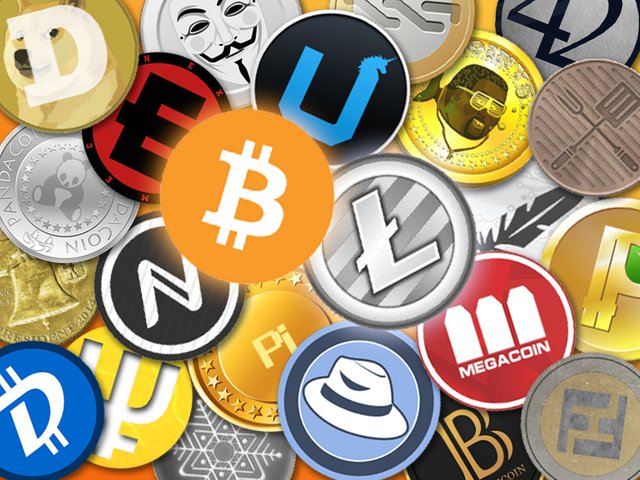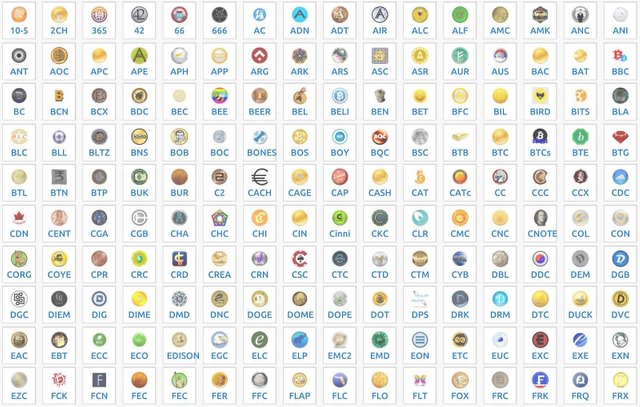The Altcoin Book of Genesis
I originally posted this on Steemit here years ago
https://steemit.com/bitcoin/@marsresident/the-altcoin-book-of-genesis


Types of Coins:
SHA-256 (Ex: #Bitcoin )
Scrypt (Ex: #DOGE )
X11 (Ex: Dash )
Blake-256 (Ex: Decred )
CryptoNight (Ex: Monero )
Dagger Hashimoto (Ex: #Ethereum )
1CC/2CC/TWN (Ex: Primecoin )
ECDSA (Ex: Ripple )

Many people have heard of Bitcoin, and more and more people are learning about Altcoins, but it’s not always easy to figure out how to make these coins yourself. So this is a guide for anyone who wants to create their own coin, as well as some History of Cryptocurrency. A Cryptocurrency can be created for anything. For example, Bitcoin was launched to get the whole idea out there. Then Litecoin created a new algorithm (Scrypt), then Peercoin created a new form of Mining (POS), then DOGE created a Memeable and long standing coin but it was just a Litecoin Clone. And these coins can be either Cloned or used as a base to create something new for:
Web Development and Social Media Currencies- STEEM is basically changing the way Social Media, and probably Websites in general, will work in 100 years.
Fundraising Currencies- As an example, NASA could create a coin, 45% premine, ask people to Mine it to support them, and then create an exchange to trade their coin on and have mining tutorials and everything. Or a Political Campaign could do the same thing.
Local Currencies- There are tons of Local Currencies like Arizona Dollars or the Ithaca Hour or Berkley Bread, but there are no Local Cryptocurrencies that have ever caught on yet. If someone created, for example, a New York Coin, or a Los Angeles Coin, and distributed flyers and maybe got a few Billboards, and had mining tutorials online somewhere. That would be a successful coin.
Redeemable Currencies- Small Businesses, Large Businesses and Websites can create Currencies that act as rewards for Public and Consumer interest in their brand. For example, a Sandwich shop could make Sandwich coin (or a coin with their shop’s name) and they can have instructions for how to mine it in their shop and make it where anyone at any time can redeem 100 Sandwich coins for X size Sandwich, or 50 Sandwich coins for X sized Drink, limit 1 or 2 per customer or whatever. And if the price of Sandwich coin skyrockets they can lower the price. This could also be done for Bakeries, or Print Shops, or Market Stalls, or Boutiques, etc, even State Fairs and Cell Phone Companies and things like that.
Club Currencies- I’m not sure this has been done yet, but maybe it has and no one has mentioned it. But a small group of people, like a Club or a Union or an Organization of some sort, like a Church, could start their own Currency, and just trade it amongst themselves at their own decided value for Fiat or Barter.
Bounty Currencies- This is similar to Fundraising, but the payment goes directly to Freelancers doing work. A Bounty Currency is a Currency where a Percent goes to the Miners, and a Percent goes to a Bounty share system. So that doing X Bounty provides X shares, which is then divided up at the end of the allotted time, and say 100 people each have 5 shares, then then each of them has 1% of the Bounty for the allotted time. Bounties can be 1 time or permanent.
Stored Value Currencies- A Stored Value Currency is meant to act like Gold. It is a currency that is hard to get, and that has a stable structure so as to ensure a high value. Maybe even backed by a Commodity, like Gold, Silver, Chocolate, Oil, etc.
The Bitcoin White Paper The Bitcoin Whitepaper was something that a lot of people didn’t read, but some people did. And it explains Bitcoins pretty well. But that is 1 Coin. There tons of other Coins besides Bitcoin and you can even make your own. But if you are going to make your own, you should at least take a look at the Bitcoin Whitepaper.
Bitcoin White Paper
https://bitcoin.org/bitcoin.pdf
POS V POW
I decided to start of with POS (Proof-of-Stake) because they are often undermentioned and underutilized. And this was understandable before, as to get involved with a POS Coin before now you either had to buy Bitcoin and use them to Buy POS coins, or mine a coin and Trade it for a POS coin, or mine a POS/POW combo coin. All of which are not really any easier than any other coin. But now there is Steemit, and because there is Steemit (and the coins/websites being created based on it) anyone can now get in to Cryptocurrency via STEEM, and use that STEEM to buy POS coins. So because of STEEM, POS is going to become much more popular. So, what is POS? POS as mentioned before I Proof-of-Stake, and was first launched in Peercoin (PPC). Proof-of-Stake means that if you are holding coins in your wallet and keeping your wallet connected to the Network, then you are “Minting” coins, which is equal to mining. With POW (Proof-of-Work) you must use Hardware and Copious amounts of electricity to get coins, with POS and minting, all a person has to do is have a computer, download a wallet and get some coins. Which thanks to Steemit is now easier than ever. POS can also be used to offset the cost of mining. Say, for example, you have a bunch of ASICs, and you mine Bitcoin (a POW coin) and get 100 Bitcoins a year, but you have to pay 30 Bitcoins worth for electricity every year. If you were to take a portion of those coins and put them in the right POS, you could get more coins for minting other coins while you mine Bitcoin.
POW was invented fist, and includes Bitcoin, Litecoin, Feathercoin, DOGE etc. while POS was invented later and includes Peercoin, Bottlecaps, DubaiCoin, Sprouts and Paycon. Peercoin, Bottlecaps and DubaiCoin are all regular POS, which means you earn anywhere from >10%-99% Interest every year by Minting/Staking coins. Paycon and Sprouts are High Rate POS, which means you earn anywhere from 100%-%10000< Interest every year for Minting/Staking coins.
Regular POS
Peercoin https://github.com/search?utf8=%E2%9C%93&q=Peercoin&type=Repositories&ref=searchresults (Peercoin was the First POS, and has the most Git Repositories based on it)
Bottlecaps https://github.com/bottlecaps-foundation/bottlecaps
DubaiCoin https://github.com/DubaiCoinDev/DubaiCoin
High Rate POS
Sprouts https://github.com/sproutcoin/sprouts
Paycon https://github.com/cryptotech/PayCon (Paycon was actually created as a joke coin, but it gained popularity and has been used for over a year now)
If you create a POS coin, the higher the Stake Rate, the more people will want to use the coin. Paycon and Sprouts are both good models to start with, but you have to add to them or they fall apart. Paycon lastedt for a while because it didn't have many coins for a High rate POS, and it’s High POS Rate is not extremely high like Sprouts, with Sprouts you can earn 100% coins back on top of your coins (meaning if you put in 1 Million coins, you get back 2 Million coins) in about 40 days, with Paycon it takes a little longer, and with Peercoin, Bottlecaps, etc, it would take years to get 100% back on top of your coins. The Sprouts Developer disappeared a few months after creating the coin, then Cryptsy shut down and that was Sprouts main trade website, and now you can’t even find the Sprouts Wallet anywhere, so no one new can use it. If you want your High Stake POS coin to work, you have to make sure to be able to solve problems like that. Paycon has been much more stable, but both are good coins to use as a model (Source Code) for your own coin. With these coins you can make over 200% profit in 1 year, as long as a community exists around the coin. And with Paycon and Sprouts you can get in with a few hundred or a few thousand Satoshi, the only problem with Sprouts is the community is completely unorganized and you can’t even find the wallet. So it’s really all about the community. The main problem with Sprouts and Paycon, and really ever single Altcoin that has ever existed, even the successful ones, is that they are created an launched into the Bitcoin community in an attempt to create a new community, when the way everyone should be doing it is to create coins for existing communities. Why reinvent the wheel? We have Altcoins, and the ability to create them, now instead of trying to make a 1,000,000 different coins with 1,000,000 emerging communities around them, why don't we find 1,000,000 existing communities, and show them how to make coins and make coins for them?
You can also make your own Steemit Type Website and STEEM type coin, here is everything you need to do it. Steemit is now Open Source, meaning anyone can make a Steemit type website by just Copying Steemit and renaming it, and changing whatever they want to change.
https://steemit.com/steemit/@steemitblog/steemit-com-is-now-open-source
https://github.com/xeroc/piston
Mint Your Own Currency

There are 2 conventional ways to make a Coin, and a few other ways to make Coins, so I am going to cover a few of them in this post, and it is actually 1000x easier than you would expect. Bitcoin is now over $2,000 each on the way to $3,000 each with a $38,882,000,000 Market Cap, that means all together, all the Bitcoins in the world are worth $38 Billion almost $39 Billion. Look at the Website Coinmarketcap.com to see how valuable a Coin can be, even if it is not Bitcoin. First, here are the "Unconventional" ways of making coins.
- CryptoNote, create your own CryptoNote (Your own Real CryptoCurrency) here https://cryptonotestarter.org/
- Token, create your own Token (Not a real coin, but can gain value) with an Ethereum Contract here https://www.ethereum.org/token
- Asset, create your own Asset (Not a real coin, but can gain value and can be traded on OpenLedger) with a Bitshares Contract here https://bitshares.openledger.info/account/ YOURUSERNAME /assets/
(You have to add your OpenLedger Username to the Link for it to work) - Possibly an in Wallet Coin Creator https://bitcointalk.org/index.php?topic=1699319.0
Now, Forking. All you do to Fork a Coin is go to the URL of that Coin on Github (most coins are on Github).
Just choose your coin, then press the ![]() icon. Once you click that you have forked the Coin. If you want to Clone the coin you click the button on that page that says "Releases" then choose the version of the Coin that you want to Clone. You may need to create a Virtual Machine and change the Operating System (OS) to Ubuntu or CentOS or one of the various Linux OSs that use Unix. Whether you are Forking or Cloning you are going to have to change a few things in the Coin's code, but this is not hard. Here is the video guide for how to create coins (This is outdated as it was made in 2015, but the process is the same you just need a few different dependencies now, which just means you have to type in a few different things in the code which downloads a few new updated things that didn't exist when the video was made)
icon. Once you click that you have forked the Coin. If you want to Clone the coin you click the button on that page that says "Releases" then choose the version of the Coin that you want to Clone. You may need to create a Virtual Machine and change the Operating System (OS) to Ubuntu or CentOS or one of the various Linux OSs that use Unix. Whether you are Forking or Cloning you are going to have to change a few things in the Coin's code, but this is not hard. Here is the video guide for how to create coins (This is outdated as it was made in 2015, but the process is the same you just need a few different dependencies now, which just means you have to type in a few different things in the code which downloads a few new updated things that didn't exist when the video was made)
Video Guide: https://bitcointalk.org/index.php?topic=1278734.0
Here is a Written Guide, it's really not that hard, you have to go in the code but there is pretty much 0 programming knowledge needed. It's basically just search and delete and replace and pretty much all in one folder of the Coin except for the graphics part and the compiling and Wallet part:
- Find-and-Replace all instances of the Old Coin name in the Code with the name you want your Coin to have
- Find-and-Replace all of the Coin identifiers in the Code, for example BTC for Bitcoin, or DOGE for Dogecoin, or LTC for Litecoin, and replace the BTC or DOGE or LTC which your Coin's identifier.
- Change the Subsidy value, this value is the number of Coins that will be rewarded to people who mine your coin, for every block they mine.
- Change the Block Time, this is the amount of time it takes for a new block to be found. So for example, you could have a Coin that has a block reward of 1000 which seems like a lot, but you could make it where this Coin only produce blocks every 5 hours, so that there are only 1000 coins made every 5 hours, which is more than Bitcoin but much slower than many other coins. Or you could make a Coin with 50 coins in a block and a block every 5 seconds or every 30 seconds.
- Change the Difficulty, this will be called Target in the code. This sets the standard for how hard it will be to mine your coin as it get further and further into its life, like how Bitcoin can't be mined on computers anymore and must be mined with ASIC machines, and there are people with entire warehouses full of ASICs mining Bitcoin because A. The Difficulty has gone up so high, and; B. Not only is the difficulty extremely high for Bitcoin, there is also tons of competition when searching for blocks because so many people have machines searching for blocks. You can find more info on Difficulty here:
https://en.bitcoin.it/wiki/Difficulty
https://en.bitcoin.it/wiki/Target - Change the Block Height (the Total number of Blocks that will ever exist, and therefor the Total number of Coins that will exist. To find the number of Coins simply multiple Total Blocks X Coins per Block).
- Change the Halving Time (This is how often the rewards for mining will halve, meaning if it starts at 100 it will halve to 50 in 7 years if you set it to 7 years, or 10 years if you set it to 10 years, etc, then it will halve to 25 after another 7 years, and 12.5 another 7 years after that, and 6.25 another 7 years after that, meaning that after 28 years anyone mining your Coin will be rewarded 6.25 Coins per block instead of 100 Coins per block like the people who mined it for the first 7 years. This allows Coins to start off fast and become more rare which allows value to go up, just like Bitcoin has. It used to be really easy to get Bitcoins, but now you are better off making your own Coin than mining Bitcoin.
- The Genesis Block will have a "x0" and a bunch of numbers after that, like "x01345328u45892394859324598324598" or something. You just erase everything except the x0, so that all the other numbers are gone and the only thing that remains is the x0.
- Remove the Merkle Root.
- Find the Headline and change the one that the Coin has to a News Headline from the day you are making your coin.
- Google the "Current Epoch Time" then change the Epoch time to the one you found.
- Remove the Nnonce.
- Remove all the Checkpoints except 1.
- Change Ports if you want.
- Use GIMP or Photoshop or a Mac or Paint to create some Graphics, and then go into the folder in the coin that has the images. One of the Graphics will go in the Wallet so when people open the wallet they see it, one will be the "Loading" graphic and will appear on their screen before the Wallet opens, and one will be the side bar that goes on a few of the windows.
- Copy your Code and create a "Clean Uncompiled Code" Folder, then Compile the Code in the one that you had before you made the copy, and keep the copy untouched.
- Run the Code and get a Fatal Error.
- Take the Merkle Root and Nnonce from the Fatal Error Code and put it in the Clean Code.
- Create another Copy to dirty up, then Compile, and Run the Code , then Mine the Genesis Block and add the Genesis Block to your Clean Code.
- Use Gitian Builder from Github to build your Wallet (just follow the instructions).
- Then put your Coin up on Github and start telling people they can download it and use it.
So that is the Conventional way to make a Coin through Cloning or Forking, another Unconventional way would be to just go and create a completely new Coin, with new features. For example, Bitcoin is Proof-of-Work (PoW) meaning that you have to mine it with real world hardware in order to get them, while Peercoin is Proof-of-Stake (PoS) meaning that you have to have Coins in your Wallet and your Wallet will mine them with no extra hardware attached to your computer. Then there is Bitshares and STEEM, which Are Delegated-Proof-of-Work-and-Stake (DPoWS) meaning that there is a way to earn it with PoW such as mining, and ways to earn it with PoS such as holding them in a Wallet, but these abilities are "Delegated" by Vote. So people Vote for people to be allowed to mine the Coins, and those people keep the network up and earn Coins. So an unconventional way to make a coin would be to just create an entirely new feature for a Coin. This would require you to come up with something, figure out how to write it into code and to launch your own Coin.
Here is some extra information about Forking and Cloning:
Adding premined Coins to your coin (many people in the existing Bitcoin community don't like premine, so don't use it unless you have a good reason or are just releasing your Coin in a local area and not to the existing Bitcoin communuity)
http://dillingers.com/blog/2015/04/23/adding-a-premine-to-an-altcoin/
Compile guide for Windows on Linux
https://bitcointalk.org/index.php?topic=1080289.0
Here is a VERY detailed guide that explains how to make a Coin, but it may be hard for many people to understand completely
http://www.theseus.fi/bitstream/handle/10024/123896/Sikorski_Timothy.pdf?sequence=1
There are also websites that you can pay to create a coin for you, and some will create a Coin for Free. Walletbuilders, ColoredCoins and Build-a-co.in are examples. I will write more soon to drill down into specifics, but this should be able to get anyone who wants to make a Coin to the point where they actually have a Coin made.
Here are a few other coins that have some interesting concepts behind them and can be used to help you create your own coin.
Bitshares Bitshares is a coin that works as a platform for users to create assets that can be traded like shares on the OpenLedger website. https://bitshares.org/ https://www.reddit.com/r/BitShares/ https://github.com/bitshares/bitshares-0.x
STEEM (Delegated-Proof-Of-Work) DPOW/POS A Social Media Based Blockchain https://github.com/steemit/steem
Namecoin Namecoin is a coin that allows users to create and Host Doman Names in their Wallet https://github.com/namecoin/namecoin-legacy
Auroracoin Auroracoin is a Coint hat used an Public Record of everyone in Iceland in order to distribute Wallets containing coins to everyone in Iceland. https://github.com/baldurodinsson/auroracoin-project https://github.com/aurarad/Auroracoin
Devcoin Devcoin was a coin that offered Lifetime Bounties for Development work as well as Monthly payments for Writers https://github.com/coinzen/devcoin https://github.com/sidhujag/devcoin-wallet
Clams Clams are a POK (Proof-of-Key) coin that allow anyone with a Bitcoin, Litecoin or Dogecoin address that existed at the time Clams were created, to redeem a Wallet with some Clams in it https://github.com/coinkeeper/2015-06-22_18-55_clams
Synereo https://github.com/synereo/blog.synereo.com https://github.com/synereo/synereo.github.io
DOGE https://github.com/dogecoin/dogecoin
Monero https://github.com/monero-project/bitmonero
Ethereum https://github.com/ethereum/go-ethereum
Datacoin/Primecoin https://github.com/foo1inge/datacoin-hp
Cryptocurrency App Creation Archive
https://steemit.com/steem/@marsresident/github-cryptocurrency-app-creation-archive
Resources for ASIC Designers and Developers
https://steemit.com/mining/@marsresident/resources-for-asic-designers

Coin Exchanges:
1szb.com
1Ex.trade
247exchange.com
24change.com
796.com
Alcurex.org
alfacashier.com
Alts.trade
Anxpro.com
askcoin.net
Basebit.com.br
bit2c.co.il
Bitebi9.com
bitex.la
Bitbay.net
bitcoin.de
bitcoin.co.id
bitcointoyou.com
Bitcurex.com
Bitfinex.com
bitflyer.jp
bitkonan.com
bitmex.com
bitnz.com
bitonic.nl
Bitorado.com
bitso.com
bitstamp.net
Bittrex.com
bittylicious.com
bitx.co/market
Bleutrade.com
bloombit.net
bt.cx
btc2day.cz
btc38.com
btc100.com
btcbox.co.jp
btcchina.com
btc-e.com
btcexchange.ph
btcgreece.com
btcpool.exchange
btctrader.com
btcxchange.ro
Bter.com
Blaketrader.com
bx.in.th
c-cex.com
campbx.com
ccedk.com
cex.io
chameleonbit.trade
chbtc.com
clevercoin.com
coinbase.com
coincheck.jp
Coinffeine.com
coinfloor.co.uk
coingather.com
coinmate.io
coingather.com
coinomat.com
coinsbank.com
coinspot.com.au
coinsquare.io
cryptofresh.com/assets
cryptomic.com
cryptonit.net
cryptopia.co.nz
dashcurex.com
ecoin.eu
empirex.ch
empoex.com
ExchangeD.I2P (anonymous. Requires i2p)
exmo.com
eXrates.me
fortunejack.com/exchange
gdax.com
gemini.com
hitbtc.com
huobi.com
ice3x.co.za
Iconomi.net
indacoin.com
itbit.com
jubi.com
justcoin.com
kraken.com
leoxchange.com
litebit.eu
livecoin.net
localbitcoins.com (p2p)
loyalbit.com
melotic.com
mercuryex.com
metaexchange.info
mexbt.com
monatr.jp
monetago.com
mycellium wallet (p2p)
negociecoins.com.br
nix-e.com
okcoin.com
poloniex.com
quadrigacx.com
quoine.com
shapeshift.io
southxchange.com
therocktrading.com
trader.flowbtc.com
usecryptos.com
vaultoro.com
vircurex.com
yobit.net
yuanbaohui.com
yunbi.com
zaif.jp